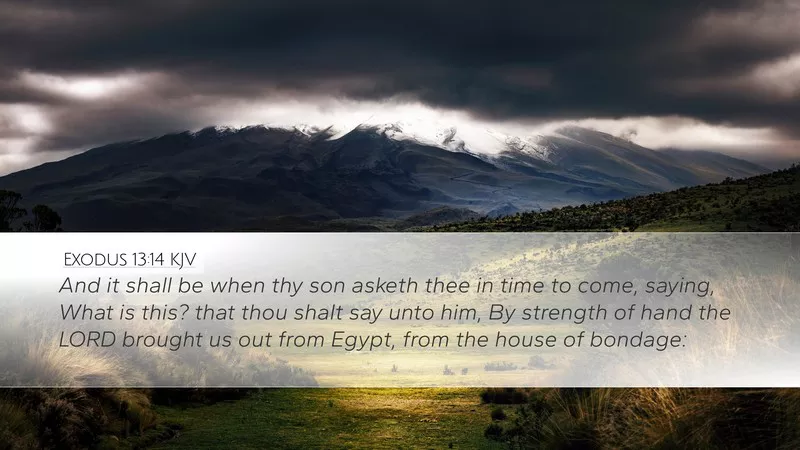Read the Daily Bible Verse – Exodus 13:14 To Strengthen Your Spiritual Journey.
Exodus 13:14 in the King James Version (KJV) reads:
“And it shall be when thy son asketh thee in time to come, saying, What is this? that thou shalt say unto him, By strength of hand the Lord brought us out from Egypt, from the house of bondage:”
This verse highlights the importance of teaching the next generation about God‘s mighty acts of deliverance and the significance of obedience to His commands. It demonstrates the centrality of remembrance in faith and the responsibility of passing down spiritual heritage.
The Context on Exodus 13:14 KJV
Historical Context
Exodus 13 occurs as the Israelites are being guided out of Egypt. The chapter emphasizes the Feast of Unleavened Bread and the consecration of the firstborn, which serve as perpetual reminders of God’s deliverance from slavery.
The verse is part of instructions given to ensure that future generations understand the significance of these practices. This was crucial, as the Israelites were transitioning from a life of bondage to freedom under God’s covenant.
Literary Context
This verse is situated in a broader narrative that intertwines remembrance with worship. Earlier in the chapter, God commands the Israelites to consecrate their firstborn (Exodus 13:2) and to observe specific rituals that commemorate their deliverance. Exodus 13:14 addresses the anticipated curiosity of future generations and provides a framework for explaining the meaning behind these rituals.
The Meaning of Exodus 13:14
Answering Future Questions
The phrase “when thy son asketh thee in time to come” anticipates a future scenario where children inquire about the significance of religious practices. It reflects the natural curiosity of younger generations and the need for intentional teaching about faith.
Acknowledging God’s Power
The response given—“By strength of hand the Lord brought us out from Egypt”—focuses on God’s intervention. The deliverance from Egypt was not merely a historical event but a divine act of power and faithfulness, worthy of continual remembrance.
Liberation from Bondage
The reference to “the house of bondage” underscores the magnitude of Israel’s deliverance. It reminds the Israelites that they were once slaves but were set free by God’s grace and power.
Exodus 13:14 Application in Life
Teaching the Next Generation
Exodus 13:14 emphasizes the importance of parents and guardians taking an active role in teaching their children about God. This principle extends to modern Christian families, where sharing stories of God’s work in one’s life and history is essential.
Remembering God’s Deliverance
Just as the Israelites were called to remember their deliverance, Christians are reminded to reflect on their spiritual freedom through Christ. Testimonies of God’s faithfulness help reinforce faith and provide a foundation for future generations.
Living as Witnesses
The verse calls believers to be living witnesses of God’s power. Explaining one’s faith and practices becomes an act of worship and a testimony to God’s saving grace.
Comparison with Other Biblical Texts
Old Testament Connections
Deuteronomy 6:20-25: This passage echoes the theme of children asking about God’s commandments. It reinforces the importance of explaining God’s actions and commands to maintain faith across generations.
Psalm 78:4-7: The psalmist stresses the importance of declaring God’s works to the next generation, ensuring they set their hope in God and keep His commandments.
Joshua 4:6-7: When the Israelites cross the Jordan River, God commands them to set up memorial stones as a reminder of His miraculous intervention, providing a tangible teaching tool for future generations.
New Testament Fulfillment
1 Peter 3:15: This verse aligns with the principle in Exodus 13:14, urging believers to always be ready to explain the hope they have in Christ.
Luke 22:19-20: Jesus institutes the Lord’s Supper as a way to remember His sacrifice, showing a continuity in the practice of remembrance and teaching its significance.
Modern-Day Relevance
Passing Down Faith
In a world increasingly distant from traditional faith practices, Exodus 13:14 reminds believers of the importance of passing down spiritual truths. Parents, mentors, and spiritual leaders bear the responsibility of instilling a strong foundation of faith in younger generations.
The Role of Testimony
Personal testimonies of God’s work in one’s life can inspire and strengthen the faith of others. Sharing how God has delivered, provided, or guided fosters a deeper understanding of His active presence.
Commemorating Deliverance
For Christians, rituals like communion serve as modern parallels to the practices commanded in Exodus 13. These observances connect believers to the story of redemption and reinforce the message of God’s saving grace.
Conclusion
Exodus 13:14 is a profound reminder of the importance of remembrance, teaching, and testimony in the life of faith. For the Israelites, it was a call to ensure future generations understood the significance of God’s deliverance from Egypt. For Christians today, it is a challenge to remember and share the story of redemption through Jesus Christ.
The verse calls believers to live as witnesses of God’s power, ensuring that their faith practices are meaningful and accessible to others, particularly the next generation. By anchoring their lives in God’s faithfulness and sharing their testimonies, believers can fulfill the mandate of Exodus 13:14, glorifying God and perpetuating His story across time.
Exodus 13:14 Commentary
Theological Insights
God’s Faithfulness: The verse underscores God’s reliability in fulfilling His promises, as seen in the Israelites’ deliverance.
Importance of Remembrance: Regularly recalling God’s actions prevents spiritual amnesia and fosters gratitude and worship.
Intergenerational Faith: Exodus 13:14 highlights the relational aspect of faith, where one generation passes down the knowledge and experience of God to the next.
Practical Reflections
The directive to explain God’s work to children suggests that faith is not just personal but communal and generational.
The emphasis on storytelling as a method of teaching underscores the power of narratives in shaping belief and identity.
You Might Be Interested In:


